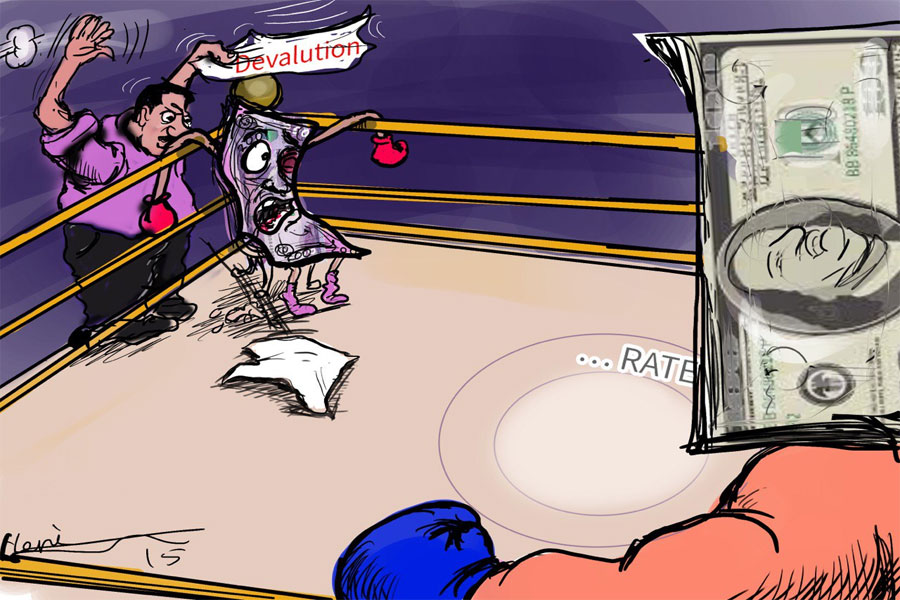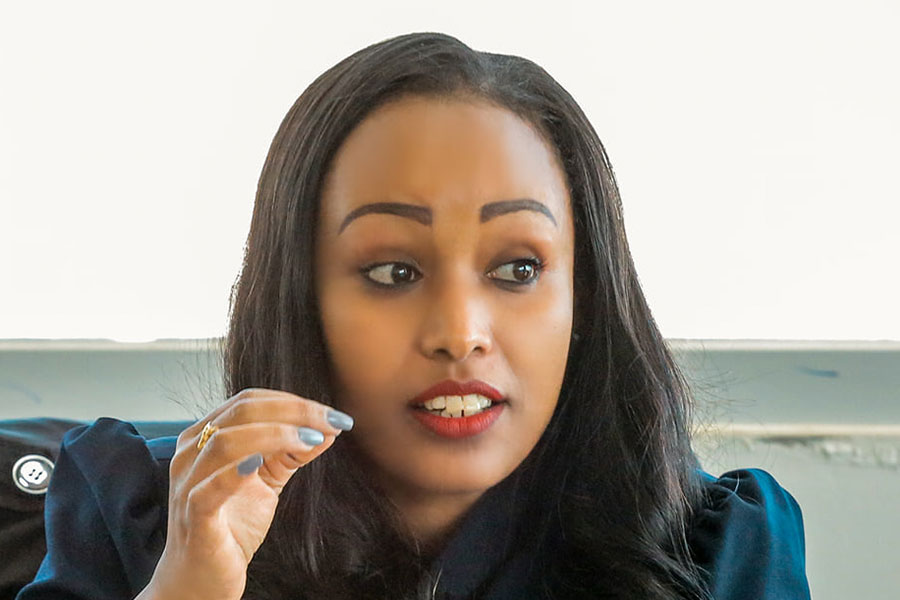
Radar | Jul 06,2025
Eden Tsegaye's morning routine has become a ritual symbolic of her dual roles as a businesswoman and a mother living in Addis Abeba. Each day begins with her sending her six-year-old daughter to kindergarten near the Alem Bank area, a simple act laden with the complexities and anxieties of a parent deeply invested in her child's education.
Eden, who supports a family of four on a monthly income nearing 10,000 Br, embodies many parents' economic and emotional struggles. Her concerns about her daughter's education are not unfounded. Despite the steep monthly school fees of 2,200 Br, she observed her daughter engaged more in playful activities than in learning fundamental skills like the ABCs. The mismatch between the cost of education and its perceived return is a source of growing unease for Eden.
The growing panic made Eden question her decision to pay for a private school.
"Why do I pay thousands for this?" she pondered.
Her dilemma, repeated in households across the city, mirrors a larger, more intricate story unfolding in the educational sector. It is part of a broader picture of sweeping educational reforms inspired by Scandinavian models and spearheaded by the Minister of Education, Brehanu Nega (PhD). These reforms, which began with kindergartens and extended to primary and high schools, have not been universally welcomed. They have sparked stormy debate among parents, educators, and policymakers, unearthing the diverse and often conflicting perspectives on the future of education.
The reforms, coordinated between the Addis Abeba Education Bureau and the Ministry of Education, have introduced radical changes.
One of the most contentious issues has been removing the English language from kindergarten curricula. Other changes include amalgamating subjects like Physics, Biology, and Chemistry under a general science umbrella in middle schools and introducing subjects such as journalism, marketing, and agriculture for senior students. These shifts reflect a broader philosophy of grounding education in the cultural and linguistic context of the students, a move away from a perceived overemphasis on theoretical knowledge and rote learning.
At the heart of these reforms is a push for practical learning. The authors of these reforms say they aim to bridge the quality gap of education provided by private and public schooling.
One of the authors is Umer Imam, head of the Ministry's social science education curriculum desk and instrumental in pushing for these changes. He talked about the efforts to bring theoretical concepts into workable projects, harmonising educational approaches across different types of schools.
Under the new system, all 26.4 million students across Ethiopia's 52,202 schools are expected to learn under a unified curriculum with their native tongue as the medium of instruction until high school. This represents a significant departure from previous practices, particularly in private schools where English has often been more than just a single subject.
This has not been without controversy, particularly among private schools accustomed to an English-centric curriculum.
The debate over the role of language in education is particularly fierce. Education officials argue that an overemphasis on the English subject in private schools does not necessarily translate to higher scores in national exams.
"They're not the ones who score the highest in national exams," Umer told Fortune. "We don't endorse adoption of a foreign curriculum."
It is a position that challenges the long-held parental belief that English proficiency is vital to academic and professional success and reexamines the role of indigenous knowledge and perspectives in education.
For Abera Tassew, president of the 1,000-strong private school lobby group, English may not be knowledge alone.
"It's, however, a bridge towards international competitiveness," Abera said.
Another architect of the curriculum, Akalewold Eshete (PhD), lectures at Addis Abeba University. he remains optimistic about the reforms, but acknowledges that resistance during implementation would exist. He criticised the previous curriculum's language orientation, arguing that it unfairly benefited private schools and created a disconnect in the quality of education. He hopes the new curriculum rectifies this, teaching children in their native languages and allowing them to focus on content.
"Implementation gaps will need further research," he told Fortune, emphasising the need for a continuous evaluation process.
However, the rigorous implementation of these changes has led to significant backlash.
In the past weeks, the Addis Abeba Education & Training Quality Regulatory Authority and the Education Bureau have begun revoking accreditations of private schools that fail to comply with the new guidelines. Officials cite failing to provide Afan Oromo classes, issue report cards in line with the authorised subjects, respond to inquiries about raising school fees, and distribute their own textbooks as transgressions against the new curriculum.
St. Michael School, a prominent private school in Yeka District, had three of its four branches accreditation cancelled for several of these reasons.
Solomon Gesese, a significant shareholder and manager of St. Michael School, contested these allegations, arguing that the school had tried aligning with the new curriculum. He pointed out the logistical challenges and the lack of consultations with private schools in the reform process.
From the Ministry, Umer recalled several rounds of discussions over the curriculum with experts drawn from Addis Abeba, Jimma, Bahir Dar and Hawassa universities.
According to Solomon, the revisions of policies on kindergarten should have included the private sector, as no public school provides schooling for kids admitted lower than first grade. According to him, the report cards from the Education Bureau came in late, with the school handing them out to students as they were delivered.
"Everything could be checked and verified," Solomon declared, pleading for a fair evaluation of the School's compliance.
A prominent educational institution with 17 campuses, Gibson School Systems, faced similar restrictions on its accreditations for allegedly using English as a medium of instruction despite notices. Apollo Global Academy also had its accreditations terminated due to the "unreasonable increases" in school fees.
The Authority issues an average of 60 new accreditations for private schools annually, in addition to the 1,500 private schools in the capital. These are subject to sudden inspections to determine alignment with the curriculum over the ensuing years. Fikeru Gebisa, head of the Authority at Gulele Branch, was behind the decision. He attributed the recent wave of restrictions on Gibson's to notices issued in advance, which the School's administrators failed to comply with.
"They can change the accreditation to an international school," he told Fortune.
Private schools in the capital say they found themselves wrestling to find qualified staff to teach diverse subjects such as visual arts, Afan Oromo and general science.
Nonetheless, Solomon's is a sentiment loudly echoed by Abera. He argued for a more extended grace period for schools to adapt to the changes, suggesting a five-year window. He revealed that a study on the potential benefits of the new reforms was sent to the Ministry by the Association, which he claimed received little attention from the officials. This lack of acknowledgement fueled the frustration of private school owners.
"Our appeals fell on deaf ears," he told Fortune.
The Association's President argued that the dismal failure rate of national examinations over the past two years, with around 55,000 students passing from close to 1.7 million, was derived from multiple factors, not just the curriculum.
The varied reactions of parents, teachers, and school owners further complicated what is already unfolding. Parents like Eden are caught between the desire for quality education for their children and the financial burden it entails.
Teachers, represented by the Private School Teachers' Association, which commands a membership of 4,000, are under pressure to adapt to the broad-ranging subjects encompassed in the 'General Science' curriculum. The Association's Spokesperson, Melak Demelash, was worried about the practical limitations of expecting teachers to proficiently administer Chemistry, Physics, and Biology lessons all in one.
"They only graduated in one field," said Melak.
The Association found itself caught in the middle, striving to protect the interests of 752,000 teachers nationwide while understanding the broader challenges schools face.
Melak observed that parents' motives to enrol their children into private schools came from a desire to impart English proficiency and quality education. He feared that more parents might switch to public schools, impacting the enrollment rates in private institutions.
"Why would they pay extra if it's all the same," he wondered.
School owners are wrestling with aligning their curriculums to the new standards while maintaining their identity and educational philosophy.
Federal education officials have provided a detailed syllabus as a curriculum roadmap, setting clear expectations and guidelines. City administrations and regional states could utilise the national policy to craft their textbooks following their particular context.
The Addis Abeba Education Bureau, operating under a 2.2 billion Br budget, modified the national curriculum based on recommendations of experts from the Kotebe Metropolitan University who conducted a study around mediums of instruction. The 2,150 schools under its oversight were instructed to either teach in the Amharic language as the primary medium of instruction with Afan Oromo as supplementary, or the other way round.
Tagaitu Ababu, deputy head of the Bureau, recalled a meeting with owners of private schools at the start of the school year, where they expressed concerns over the issue of the English language as a medium of instruction and the inadequacy of teachers.
"We forwarded their concerns to the Ministry," she told Fortune.
She acknowledged delays in textbook delivery but argued it was a slight inconvenience in implementation.
"We'll aggressively pursue our implementation procedures," said the Deputy Head.
Tagaitu revealed that the Bureau had warned some private schools that they would be denied the right to have their students sit for national exams if they proceeded with their ways.
The focus on teachers' training emerged as a crucial strategy to ensure a smooth transition. The Kotebe Metropolitan University is preparing a module to aid teachers, recognising the need for additional support in the face of the new challenges.
Experts such as Alemayehu Teklemariam (PhD) appreciated the orientation towards practice and project-based learning, considering it a good start despite the current implementation problems. Lecturing at Addis Abeba University's Inclusive Education Department, he offered a different perspective, pointing to the lack of proper methodology in teaching English as the primary cause of the problem.
"Merely adopting curriculum from other countries won't solve the education problem," Alemayehu cautioned.
Alemayehu would want to see schools create customised textbooks in a language of their choice. While acknowledging the severe constraints in technical and financial resources, he believes in tailoring educational materials to suit the local context.
However, this has not quelled the concerns of parties involved, from parents like Eden and teachers like Melak to school owners such as Solomon, who argue for a more inclusive and consultative approach to educational reform, reflecting education's nature and purpose. The impact is not confined to the academic curricula but extends to the very identity of educational institutions.
PUBLISHED ON
Dec 30,2023 [ VOL
24 , NO
1235]

Radar | Jul 06,2025

Viewpoints | Jan 27,2024

Editorial | Dec 17,2022

Covid-19 | Feb 13,2021

Radar | Apr 27,2025

Viewpoints | May 31,2025

My Opinion | Nov 19,2022

Verbatim | Sep 30,2023

Commentaries | Oct 26,2019

Verbatim | Dec 04,2021

Dec 22 , 2024 . By TIZITA SHEWAFERAW
Charged with transforming colossal state-owned enterprises into modern and competitiv...

Aug 18 , 2024 . By AKSAH ITALO
Although predictable Yonas Zerihun's job in the ride-hailing service is not immune to...

Jul 28 , 2024 . By TIZITA SHEWAFERAW
Unhabitual, perhaps too many, Samuel Gebreyohannes, 38, used to occasionally enjoy a couple of beers at breakfast. However, he recently swit...

Jul 13 , 2024 . By AKSAH ITALO
Investors who rely on tractors, trucks, and field vehicles for commuting, transporting commodities, and f...

Jul 12 , 2025
Political leaders and their policy advisors often promise great leaps forward, yet th...

Jul 5 , 2025
Six years ago, Ethiopia was the darling of international liberal commentators. A year...

Jun 28 , 2025
Meseret Damtie, the assertive auditor general, has never been shy about naming names...

Jun 21 , 2025
A well-worn adage says, “Budget is not destiny, but it is direction.” Examining t...